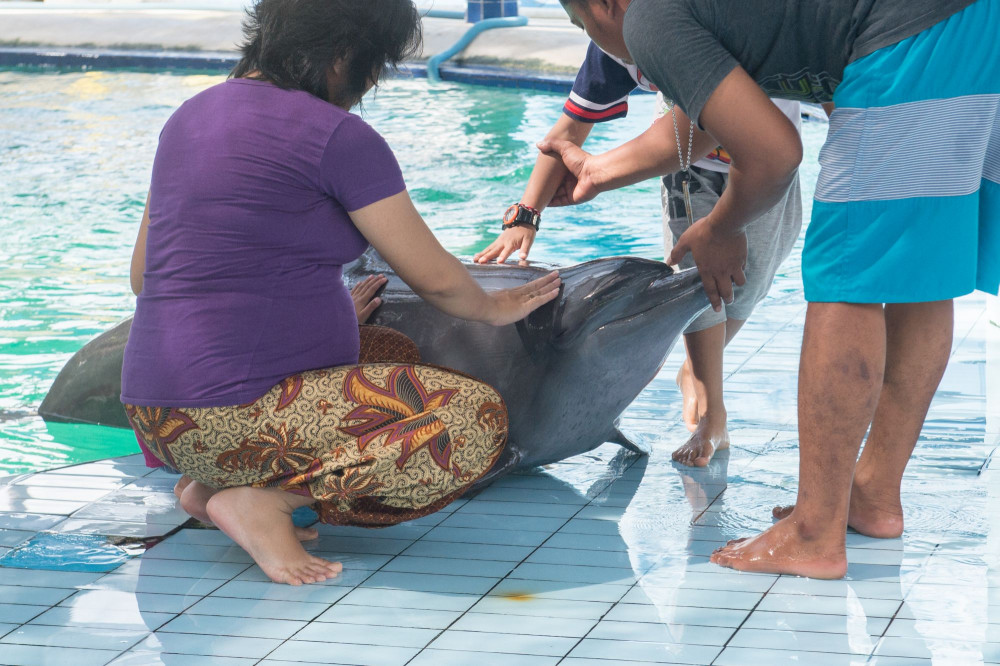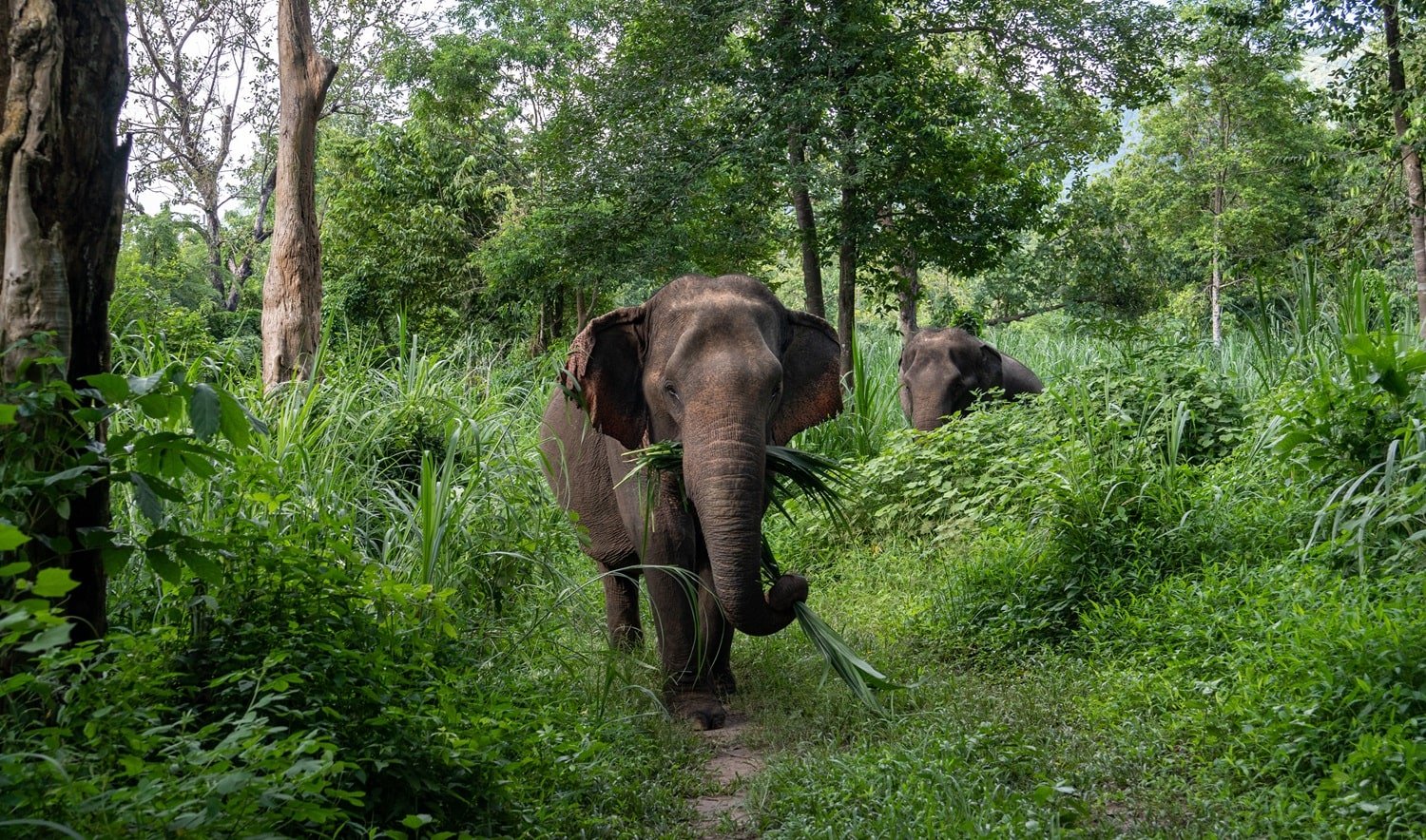Waves of Profit
An investigation into the travel industry’s role as the main economic driver of the annual six-month dolphin hunt in Taiji, Japan.

Consumers are increasingly demanding sustainable and responsible travel opportunities that don’t cause harm to wildlife. With 75 years of experience in protecting animals, our team can help you ensure that your offerings respect animals and the people whose livelihoods may depend on them, while still providing a unique wildlife experience.
We've helped some of Australia and the world’s biggest travel companies such as Intrepid, YHA Australia, World Expeditions, Adventure World, Contiki and the entire Travel Corporation family of brands develop their animal welfare policy to protect wildlife from harm and provide guidance for responsible activities involving animals in tourism. We’ve continued to support these companies on in region interventions where unacceptable animal practices come to light.
Are you ready to take the first step towards becoming a wildlife-friendly travel company?

Image credit: Raggy Charters
These ‘once-in-a-lifetime' opportunities for a tourist means a lifetime of suffering for animals.
As a member of the travel industry, you have the power to help protect these animals. By implementing a robust animal welfare policy, you can help travellers make responsible holiday decisions and help drive down the demand for activities involving animal cruelty.

Today's travellers are choosing holidays based on how ethical and animal-friendly they are. Our polling has time and again revealed the dramatic shift in travellers’ attitudes. They are becoming more aware of the cruelty involved in captive wildlife tourism.
Our 2022 global consumer survey with 23,726 participants over the age of 16 across 15 countries found that:
Travel companies of all sizes can meet their customers’ needs while helping to put an end to cruel wildlife entertainment. If you’re confused about what exactly is ‘wildlife-friendly tourism’ or are not sure where to start, don’t worry because we’re here to help.


Image credit: World Animal Protection / Andito Wasi
Take a look at some of our investigations into wildlife tourism across the world.

An investigation into the travel industry’s role as the main economic driver of the annual six-month dolphin hunt in Taiji, Japan.

A reinvestigation into 34 popular wildlife tourism venues across Bali and Lombok that exposes the inadequate captive conditions that wild animals are kept in on these islands.

An investigation into iconic Australian wildlife venues Australia Zoo, Dream World and Sea World exploiting wild animals for profit through forced visitor interactions.
Stay informed by signing up for the latest updates on our investigation and reports into the travel and tourism industry.

You can help build a responsible, sustainable future for the tourism industry while meeting customer needs and helping end captive wildlife entertainment for good. Here are six easy steps to become a responsible travel company that protects wildlife.
Create a policy with guidance from us and ask suppliers to plan a phase out of any activities and attractions that are no longer acceptable as part of your product offers. A good policy will help ensure you are assessing animal-based tourism consistently with the latest scientific information and mitigate the risk of being criticised for not doing enough.
Activities that negatively impact animal welfare and the conservation of species in the wild, and that can be of high risk to the health and safety of your travellers include direct interaction with wild animals and wild animals performing.

Assess the value of these activities and start to look for non-animal and ethical animal alternatives, such as watching animals from a safe and respectful distance in their natural habitats, Wildlife Heritage Areas or at a genuine sanctuary where the animals are not bred in captivity or traded.
Start conversations with your suppliers to help them understand that change is needed and that you are looking for responsible alternatives to replace wildlife entertainment activities. Remember that while ethical experiences exist, a company like yours can help phase out wildlife entertainment by asking ground suppliers to stop commercial breeding and trade while improving the conditions of those animals already in captivity.
We are happy to offer you training modules, checklists and research that will allow your staff to identify cruel attractions and activities, understand truly ethical wildlife experiences, and own your company’s animal welfare policy.

Speak out about your company’s commitment to animal welfare and educate your customers on how to be animal-friendly travellers. Education is vital to shift demand towards responsible tourism.
We're here to guide and support you along the way, drop us an email today. Together, we can end the suffering of captive wild animals in tourism.

Wildlife Heritage Areas is a global programme that we developed with the World Cetacean Alliance that recognises global destinations that offer responsible wildlife-watching tourism. These destinations incorporate high standards of animal welfare, sustainability, and nature conservation to help ensure wildlife, ecosystems, and communities can survive and thrive together.
Each area goes through an application process developed by the Wildlife Heritage Network of specialist NGOs, wildlife experts, responsible tourism companies, and local communities. The ultimate goal of this initiative is to provide travel companies like yours and tourists with examples of identifying and supporting responsible wildlife tourism destinations with high standards of animal welfare, biodiversity conservation, and community well-being. The Whitsundays is one such area.

Responsible wildlife tourism initiatives
Whale Heritage Sites are an ethical tourist option to have meaningful experiences with whales and dolphins.
Learn more
Responsible wildlife tourism initiatives
The best place to catch a glimpse of elephants in all their glory is, without a doubt, the wild. But this is not always possible.
Learn moreTo cater to the demand for elephant attractions, thousands of elephants are being taken from the wild or bred in captivity, beaten into submission, and forced to suffer in the name of wildlife tourism. However, there is a way for tourist venues to be commercially viable while being elephant friendly.
Over the past few years, many such venues are increasingly shifting away from cruelty and are transitioning to elephant-friendly venues that provide responsible elephant experiences to tourists. The transition allows elephants to be free to behave as they would in the wild; free to roam the valley, graze, and bathe in mud, dust, and water.
With help from us and some leading travel companies, two elephant venues ChangChill and Following Giants in Thailand have transitioned into elephant-friendly and stopped direct visitor interactions with their resident animals. They offer a better life for the elephants and a unique experience for travellers without the inherent cruelty of direct interactions.
We support genuine wildlife sanctuaries around the world to help care for previously exploited animals that cannot be returned to the wild. Until the exploitation of these animal's end, they need responsible care.
We partnered with Asociatia Milioane de Prieteni, an animal association in Romania, to create and manage Europe’s largest bear sanctuary. The sanctuary was created to facilitate the legal confiscation of captive bears from poor welfare conditions and ensure the lifetime care of those bears. As part of their fundraising programme, the sanctuary to paying visitors since mid-2013 in a way that does not adversely affect the welfare of the bears.
The travel industry can play a key role in a responsible future for elephants by only promoting and selling such responsible wildlife experiences.

Responsible wildlife tourism initiatives
Since 2005, World Animal Protection supported Asociatia Milioane de Prieteni (AMP) in creating the world’s largest bear sanctuary.
Learn moreEvery day billions of animals experience unbearable suffering. At World Animal Protection we move the world to protect animals because the life of every animal counts.
Working around the world to end the needless suffering of animals by inspiring people to change animals’ lives for the better.
Animals are sentient beings who can feel complex emotions like happiness, fear, and pain, to name a few. Like us, they too deserve to be happy and free in their homes – the wild.